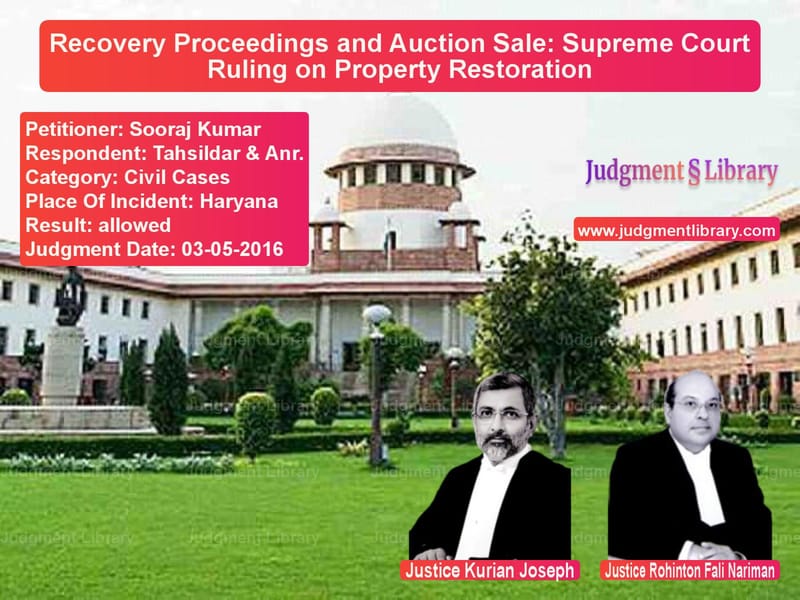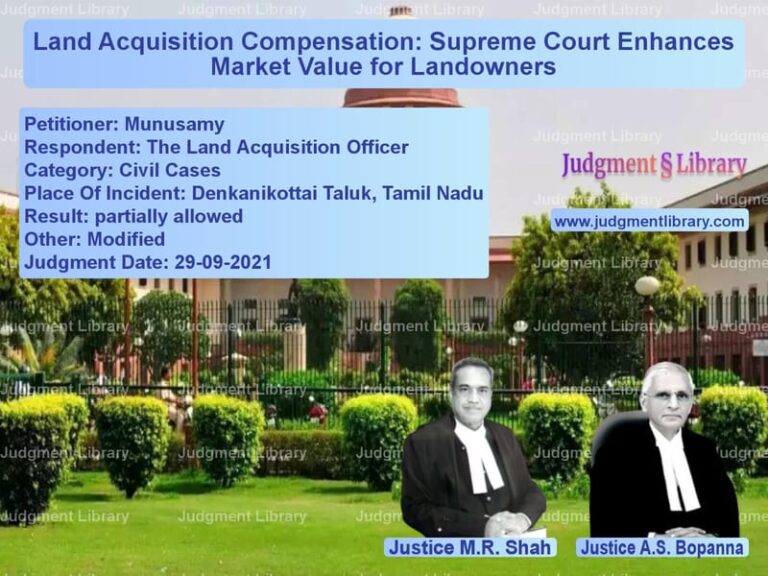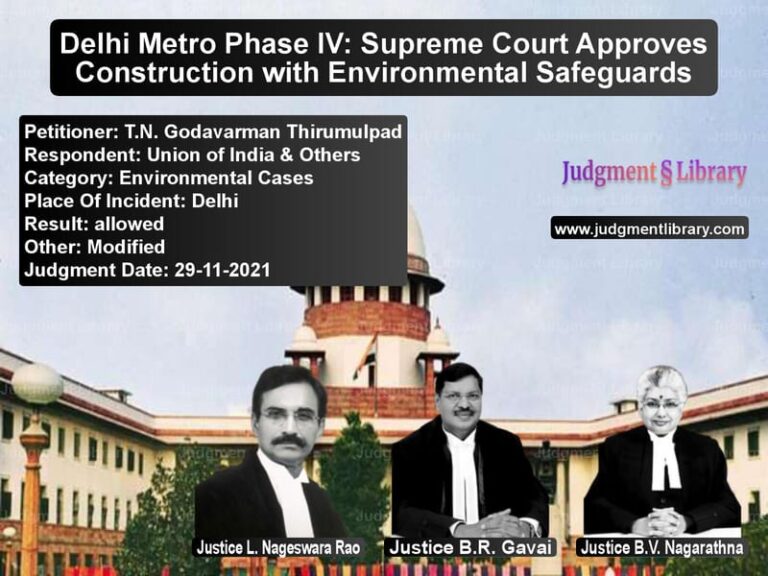Recovery Proceedings and Auction Sale: Supreme Court Ruling on Property Restoration
The appellant, Sooraj Kumar, filed a civil appeal challenging the recovery proceedings initiated against him, which culminated in the auction sale of his property. The case primarily revolved around the auction process, where the government auctioned his property to itself at a nominal price of Re. 1/- in full and final settlement of dues. The appellant contended that the auction proceedings were invalid due to the lack of proper inquiry into the market value of the property.
Background of the Case
The appellant, Sooraj Kumar, had a property that was subjected to recovery proceedings due to outstanding dues. The property was auctioned off by the government to itself at a very low price. The appellant argued that the auction process was flawed, and the market value of the property was not taken into account. He claimed that the auction sale at such a nominal price violated the principle of fairness and transparency. The appellant sought to set aside the auction and restore the property to him.
Petitioner’s Arguments
The appellant’s counsel argued that the entire auction process was vitiated due to the lack of a proper inquiry into the market value of the property. The auction, where the property was sold for a nominal amount of Re. 1/-, was conducted without adhering to the necessary legal procedures. The appellant contended that such a sale could not be considered fair or just, and that the property should be restored to him. Furthermore, the appellant expressed his willingness to settle the outstanding dues through the applicable Amnesty Scheme.
Respondent’s Arguments
The respondents, the Tahsildar and the concerned authorities, did not raise significant objections to the appellant’s submission that the auction price was far below the property’s market value. However, they pointed out that the auction sale had been completed as part of the recovery process and that the property had been transferred as part of the legal proceedings.
Key Legal Arguments and Observations
The Validity of Auction Sale
The appellant argued that the auction proceedings were unlawful due to the lack of a proper valuation of the property. The Court noted that the appellant had raised valid concerns regarding the auction price being disproportionately low. However, it was clarified that the appellant had an opportunity to settle the outstanding dues through the Amnesty Scheme, which would allow him to clear the dues without the consequences of the auction sale.
The Court recognized that if the appellant availed of the Amnesty Scheme, the auction could be recalled, and the property could be restored to him. The Court thus set the stage for a settlement based on the available legal scheme, provided the appellant adhered to the terms and conditions of the Amnesty Scheme.
Amnesty Scheme and Restitution
The appellant expressed readiness to settle the entire outstanding amount under the Amnesty Scheme. The Court emphasized that if the appellant opted for this settlement, the auction sale could be annulled, and the property could be restored in his favor. The Court further instructed the authorities to take appropriate action regarding the application filed by the appellant for settlement under the Amnesty Scheme within three months from the date of the judgment.
Compensation and Refunds
As part of the settlement, the amount of Rs. 10 lakhs deposited by the appellant earlier would be adjusted towards the outstanding dues under the Amnesty Scheme. This ensured that the appellant’s efforts to settle the matter would be recognized, and the amount paid would count toward clearing his liabilities.
Supreme Court’s Judgment
The Supreme Court ruled that if the appellant opted to settle the dues under the Amnesty Scheme, the auction proceedings could be recalled, and the property would be restored to the appellant. The Court gave a clear directive that if the appellant adhered to the terms of the Amnesty Scheme, the authorities were required to take appropriate action within three months.
The Court also clarified that the Rs. 10 lakh previously deposited by the appellant would be adjusted toward the dues as per the Amnesty Scheme. The appeal was disposed of with the direction that the appellant could utilize the Amnesty Scheme to resolve the issue, and the property could be restored to him based on compliance with the scheme.
Conclusion
This case highlights the importance of ensuring fairness in the recovery process, particularly when it comes to property auctions. The Supreme Court’s judgment underscores the significance of adhering to legal procedures in the valuation and auction of property. Furthermore, the Court’s decision to allow for the restoration of the property under the Amnesty Scheme provides a pathway for the appellant to resolve the matter amicably while ensuring justice is served. The ruling also sets a precedent for future cases involving the validity of auction sales and the rights of property owners in recovery proceedings.
Don’t miss out on the full details! Download the complete judgment in PDF format below and gain valuable insights instantly!
Download Judgment: Sooraj Kumar vs Tahsildar & Anr. Supreme Court of India Judgment Dated 03-05-2016-1741860832385.pdf
Direct Downlaod Judgment: Direct downlaod this Judgment
See all petitions in Property Disputes
See all petitions in Damages and Compensation
See all petitions in Debt Recovery
See all petitions in Judgment by Kurian Joseph
See all petitions in Judgment by Rohinton Fali Nariman
See all petitions in allowed
See all petitions in supreme court of India judgments May 2016
See all petitions in 2016 judgments
See all posts in Civil Cases Category
See all allowed petitions in Civil Cases Category
See all Dismissed petitions in Civil Cases Category
See all partially allowed petitions in Civil Cases Category







